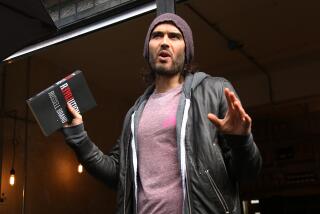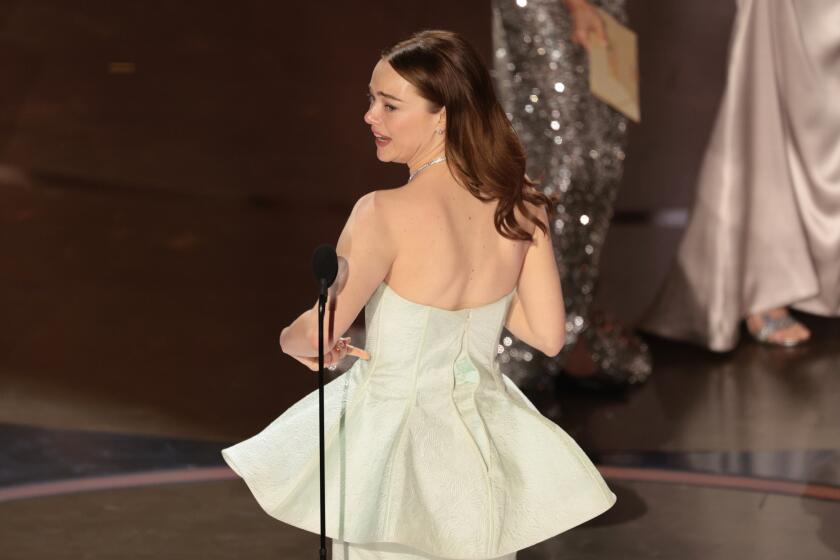Dropping the act to find success
JOHN GATINS was struggling to get his new DreamWorks film, “Dreamer,” made when he heard good news. If the writer-director could somehow get Dakota Fanning to play the key role of a girl who falls in love with a promising filly whose career has been derailed by a broken leg, the movie would get a greenlight. Desperate to keep the movie alive, he phoned Fanning’s agent and persuaded her to let him stop by and make his pitch in person.
When Gatins arrived, the receptionist took one look at him and handed him an acting audition form. Instead of correcting her, he patiently filled it out, checking off his educational background, acting experience and skill levels at everything from horseback riding to martial arts. When the agent realized he was there to discuss a film part for Fanning, everyone had a good laugh -- and Gatins eventually got Fanning to sign on for the film.
As it turns out, Gatins had plenty of experience with audition forms. He was a struggling actor for years before he achieved success as a screenwriter and made the leap to directing. If there’s one reason there are so many pitch-perfect performances in “Dreamer,” due out Oct. 21 and starring Fanning, Kurt Russell and Kris Kristofferson, it’s because Gatins knows better than most the hard work that goes into acting. Gatins arrived in Hollywood in the early 1990s, a handsome, quick-witted guy, eager to make his mark. But after years of scrambling and sending out resumes, he never made it past grade Z horror films.
“I’d love to say I didn’t do well because I didn’t get my chance, but the reality is that I couldn’t really act,” the 37-year-old filmmaker says over lunch, his tales of career ups and downs sprinkled with self-deprecating humor. “I was in a few horror movies, but hey, ‘Leprechaun 3’ is scary mostly because of my acting. I really had no idea what I was doing.”
Even when he found himself rubbing shoulders with top-flight talent, he couldn’t shake his misery. “I’d audition with people like Brad Pitt, and I finally realized, ‘He’s Brad Pitt and I’m not,’ ” he says.
To make ends meet, he worked as a nanny, a bartender and a restaurant valet. The closest he got to celebrity was working at a plant store, where he earned his keep watering Michael Douglas, Brad Pitt and Sandra Bullock’s plants. When he landed the part in “Leprechaun 3,” he asked the store owner for time off. “I didn’t want to lose my plant shop job,” he explains. “I somehow knew that ‘Leprechaun 3’ wasn’t going to lead to ‘Legends of the Fall.’ ”
Playing poker one night, a friend in the business told him he was good at making people laugh -- he should be a writer. Gatins asked the plant shop owner if he could have six weeks off to write a movie. The shop owner said, “How about four?”
When he finished the script, a youth comedy called “Smells Like Teen Suicide,” he started taking studio meetings. Not owning an automobile, he borrowed friends’ cars to drive to meetings. “The director who was attached to the movie finally said to me one day, ‘You have a different car every day. What are you, a used-car salesman?’ ”
One day Gatins came home and his wife told him he had 15 phone messages. A bidding war had broken out. The script eventually sold for $225,000. It never got made, but the heat from the sale got Gatins a job rewriting “Varsity Blues,” where he struck up a friendship with producers Mike Tollin and Brian Robbins. Gatins has worked with the producing team ever since, on “Dreamer” as well as a variety of sports-oriented dramas, including “Coach Carter” and “Hard Ball.” The work paid the bills but didn’t exactly earn him professional heft.
When Gatins was hired to rewrite “Behind Enemy Lines,” he flew to Slovakia, where he was introduced to a wary Owen Wilson, the film’s star. ‘He was a little suspicious that the ‘Varsity Blues’ guy was there, rewriting his movie. I remember him saying, ‘You ever read any J.D. Salinger?’ ”
It’s fitting that when Gatins decided to direct, he chose an underdog story. Coming from a family of New York City policemen, he was hit hard by the events of 9/11. Searching for something that captured the optimism and tenacity of pre-Paris Hilton America, he came up with a story about a down-on-his-luck thoroughbred trainer who stumbles onto a broken-down horse that gives him one last shot at salvation. When in Kentucky doing research, he met a veterinarian who told him the story of the racehorse Mariah’s Storm, who made a miraculous comeback after a serious injury.
“Dreamer” is burdened with its ungainly “Inspired by a True Story” subtitle only to avoid a legal fight with 20th Century Fox, which owns the title because it made an NC-17 erotic thriller called “The Dreamers.” It’s hard to imagine anyone confusing one film with the other. DreamWorks says Fox took the hard line in retaliation for “War of the Worlds,” which was co-financed by DreamWorks and bumped Fox’s “Fantastic Four” off its original summer release date. Fox disputes that, saying it never releases any of its permanently protected film titles.
When Gatins finished the script, he took it to Paramount, then to Warners, which wouldn’t commit without a star in the trainer’s role. When DreamWorks got involved it insisted on a star as well. Gatins finally scored a meeting with Russell, who was not especially enamored with his role. Gatins did lots of rewriting before Russell was satisfied. In Kentucky, just before filming started, Russell had Gatins sit in his hotel room each morning and act out the movie with him. Having owned horses his whole life, Russell was a natural as the trainer. “He had no fear,” Gatins recalls. “One day a horse knocked him down and he just got up, put his hat back on and finished the take.”
The film’s surest hand belongs to Gatins, who invests emotion into a simple story without wallowing in sentimentality. As a look at recent film history demonstrates, actors make especially self-assured directors. You can field quite a gifted actor-turned-director all-star team, starting with Clint Eastwood, Mel Gibson, Ron Howard and Robert Redford, not to mention such younger talent as Todd Field (“In the Bedroom”), Tim Robbins (“Dead Man Walking”) and Liev Schreiber (“Everything Is Illuminated”). In recent weeks, we’ve seen a host of films from actors turned directors, including George Clooney, Bill Paxton, John Turturro, John Stockwell and Julian Fellowes.
“People forget that actors actually have spent more time on film sets than anybody, which often gives them a comfort level that makes them especially good under pressure,” says Universal Pictures Chairwoman Stacey Snider, who has worked closely with Howard and actor-director Pete Berg, who made “Friday Night Lights.” “We’re making a film now that Robert De Niro is directing, and it’s been remarkable to see what a great storyteller he is. Actors are creative, emotional creatures, so they have a real affinity for dramatic material.”
The best actor-directors have learned at the feet of gifted masters. Howard kept an eagle eye on George Lucas making “American Graffiti.” Warren Beatty did the same working with Elia Kazan, as Redford did with Sydney Pollack. For Eastwood, film school was being on a set, studying Sergio Leone’s painterly eye and Don Siegel’s economical storytelling. As Eastwood has often said, Siegel was his Zen master. He taught him that film directing was not only knowing “what you want to shoot, but knowing what you’re seeing when you see it.”
“Directors who’ve been actors have a greater respect for the mystery of the process,” says Tollin. “We spent many a day with Kurt, chewing the fat, discussing what a scene was about, but John never got impatient or rattled. A director who’s been an actor realizes you have to be a little Zen about filmmaking -- you can’t force the magic moments to happen.”
Movie stars who become filmmakers have the advantage of using their star wattage to serve their directorial ambitions. “When Warren Beatty needed extra money from the studio, he came in as Warren Beatty, the movie star,” explains DreamWorks marketing chief Terry Press. “I’ve seen grown studio executives turn into little boys when a star enters the room. Let’s face it, if you’re in a room talking with George Clooney about his movie, it’s a lot different than talking with someone who’s directed a bunch of music videos.”
Gatins was never a movie star, but his modesty and lack of cynicism made his film set a comfortable place to work. Having struggled himself, he empathized with the rigors of the job. One day, Gatins’ producers took him along when they were trying to woo Diane Lane to play in a role in “Hard Ball.” She looked at Gatins and said, “You an actor?” “I was,” he replied. “Good,” Lane said. “I like someone who’s suffered from both sides.”
More to Read
Only good movies
Get the Indie Focus newsletter, Mark Olsen's weekly guide to the world of cinema.
You may occasionally receive promotional content from the Los Angeles Times.






